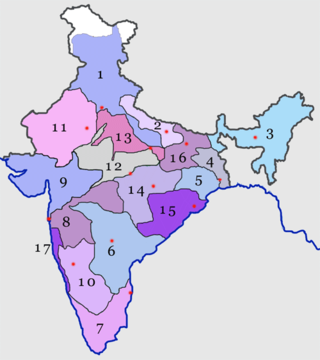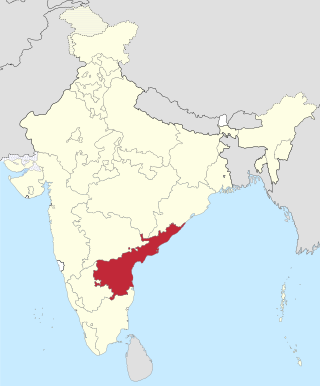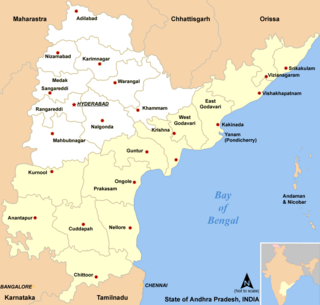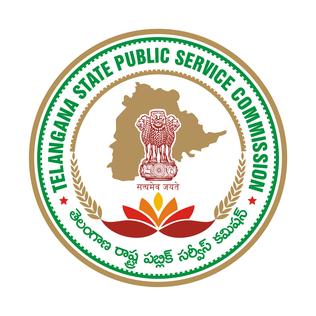Related Research Articles

The South Central Railway is one of the 19 zones of Indian Railways. The jurisdiction of the zone is spread over the states of Telangana, Maharashtra, Karnataka, Andhra Pradesh. It has three divisions under its administration, which include Secunderabad, Hyderabad and Nanded. Secunderabad railway station is the headquarters

Coastal Andhra or Kosta Andhra is a geographic region in the Indian state of Andhra Pradesh. Vijayawada is the largest city in this region .Region share borders with Uttarandhra,Rayalaseema and Telangana It was part of Madras State before 1953 and Andhra State from 1953 to 1956. According to the 2011 census, it has an area of 91,915 square kilometres (35,489 sq mi) which is 57.99% of the total state area and a population of 34,193,868 which is 69.20% of Andhra Pradesh state population. This area includes the coastal districts of Andhra Pradesh on the Circar Coast between the Eastern Ghats and the Bay of Bengal, from the northern border with Odisha to Rayalaseema in the south.

Telangana is a state in India situated on the south-central stretch of the Indian peninsula on the high Deccan Plateau. It is the eleventh-largest state and the twelfth-most populated state in India with a geographical area of 112,077 km2 (43,273 sq mi) and 35,193,978 residents as per 2011 census. On 2 June 2014, the area was separated from the northwestern part of Andhra Pradesh as the newly formed state of Telangana, with Hyderabad as its capital.

Rayalaseema is a geographic region in the Indian state of Andhra Pradesh. It comprises four southern districts of the State prior to districts reorganisation in 2022 namely Kurnool, Anantapur, YSR and Chittoor districts. Four new districts were created from these namely Sri Sathya Sai Nandyal, Annamayya and Tirupati The As of 2011 census of India, the western four districts of the region had a population of 15,184,908 and covers an area of 71,060 km2 (27,440 sq mi).

Nizamabad is also known as Induru is a city in the Indian state of Telangana. Nizamabad is a major urban agglomeration and third largest city in the state. It is governed by municipal corporation and is the headquarters of the Nizamabad district. Although previously part of Hyderabad State and then Andhra Pradesh state, Nizamabad became a part of the newly formed state of Telangana by the Andhra Pradesh Reorganisation Act, 2014.It is located about 186 kilometres (116 mi) north of the state capital, Hyderabad.

The Telangana High Court is the High Court for the Indian state of Telangana. Founded by the 7th Nizam Mir Osman Ali Khan, initially, it was set up as High Court of Hyderabad for the then Princely State of Hyderabad Deccan and later renamed High Court of Andhra Pradesh, as it was set up on 5 November 1956 under the States Reorganisation Act, 1956.The Andhra Pradesh High Court was renamed as High Court of Judicature at Hyderabad in view of the bifurcation of Andhra Pradesh state.

Andhra State was a state in India created in 1953 from the Telugu-speaking northern districts of Madras State. The state was made up of this two distinct cultural regions – Rayalaseema and Coastal Andhra. Andhra State did not include all Telugu-speaking areas, as it excluded some in Hyderabad State. Under the State Reorganisation Act of 1956, Andhra State was merged with the Telugu-speaking regions of Hyderabad State to form Andhra Pradesh.
Central Waqf Council, India is an Indian statutory body established in 1964 by the Government of India under the Waqf Act, 1954 for the purpose of advising it on matters pertaining to the working of the State Waqf Boards and proper administration of the Waqfs in the country. Waqf is a permanent dedication of movable or immovable properties for religious, pious or charitable purposes as recognized by Muslim Law, given by philanthropists. The grant is known as mushrut-ul-khidmat, while a person making such dedication is known as Wakif.

The recorded history of Andhra Pradesh, one of the 28 states of 21st-century India, begins in the Vedic period. It is mentioned in Sanskrit epics such as the Aitareya Brahmana. Its sixth-century BCE incarnation Assaka lay between the Godavari and Krishna Rivers, one of sixteen mahajanapadas. The Satavahanas succeeded them, built Amaravati, and reached a zenith under Gautamiputra Satakarni.

Moula-Ali commonly known as Moula Ali. It is a well-developed industrial and urban area in Malkajgiri Mandal, of the Medchal-Malkajgiri district, It is a part of Greater Hyderabad and also a part of Hyderabad Metropolitan Region of the Indian state of Telangana, This area is well connected with rail transportation through the Moula Ali Railway Station. It is noted for its Moula Ali hill, on top of which stands the Moula Ali Dargah and mosque, dedicated to Ali.

The Andhra Pradesh Public Service Commission (APPSC) was formed when the state of Andhra Pradesh formed on 1 November 1956. Earlier, the commission was known as the Andhra Service Commission (formed in 1953) which is based on the regulations of Madras Public Service Commission. Later in 1956, APPSC was formed by merging the Andhra Public Service Commission and Hyderabad Public Service Commissions.
Nimra College of Engineering and Technology (NCET) is a private, minority institution, established by Nimra Educational Society in 1997 to offer undergraduate and post graduate education in engineering and technology.
Fasli Calendar or Fasli era, Fasli is a harvest-based calendar system that was used across South Asia, but today, is mainly used in Deccan. It was the official calendar of Hyderabad Deccan.

The history of the Telangana movement refers to the political and social conditions under which the Telangana region was merged with Andhra State to form the state of Andhra Pradesh and the subsequent demands to reverse the merger to form a new state of Telangana from united Andhra Pradesh.

The Telangana State Public Service Commission, chiefly, TSPSC is a body created by the Constitution of India to select applicants for civil service jobs in the Indian state of Telangana according to the merits of the applicants and the rules of reservation.

Jaleel Khan, is an Indian politician from the state of Andhra Pradesh. He was MLA of Vijayawada West constituency.
Mohammed Asad Ullah Sayeed was an IAS officer with government of Andhra Pradesh from 1950 to 1978 and former founding chairman of NAM which is a charitable organisation based out of Hyderabad,India.He served as district collector of Mahbubnagar, Khammam and East Godawari districts of the then undivided state of Andhra Pradesh.
The Uttar Pradesh Sunni Central Waqf Board is a body constituted under The Wakf Act, 1995 of the Government of India, for general superintendence of the affairs of Sunni Muslim waqf (charity) properties, waqf institutions of the Sunni Muslim community of the state of Uttar Pradesh in India. Its chairman is Zufar Ahmad Faruqi. The Sunni Waqf Board has been the main Muslim litigant in the Babri Masjid–Ram Janmabhoomi title dispute.

Vijayawada–Hyderabad Expressway is a 247 km long, 4/6 lane wide tolled expressway that connects Vijayawada in Andhra Pradesh with Hyderabad in Telangana. It was opened for public in October 2012. The project was undertaken by concessionaire GMR Hyderabad Vijayawada Expressways Private Limited, a subsidiary of GMR Group on a Build-Own-Operate-Transfer (BOOT) basis. It is one of the busiest expressways in India and is a part of National Highway 65, which connects Machilipatnam to Pune.
References
- ↑ "Home". Archived from the original on 21 July 2011. Retrieved 21 August 2011.
- 1 2 3 "Strategies to Develop Waqf Administration in India, by Hasanuddin Ahmed and Ahmadullah Khan1" (PDF). Retrieved 21 August 2011.
- ↑ "powers". Archived from the original on 21 July 2011. Retrieved 21 August 2011.
- ↑ "State Wakf Board to conduct free mass marriage". www.thehindu.com. 22 April 2011. Retrieved 21 August 2011.
- ↑ "Wakf Board Chairman On Surprise Tour" . Retrieved 21 August 2011.
- ↑ "Shia Companions". Archived from the original on 26 November 2013. Retrieved 19 May 2019.